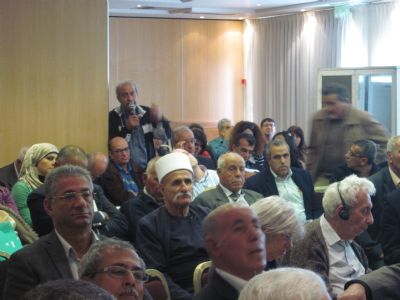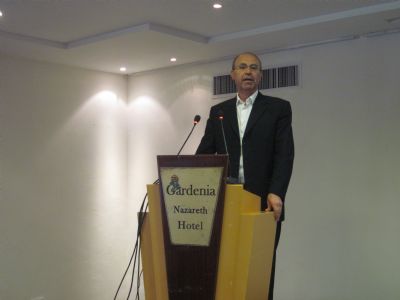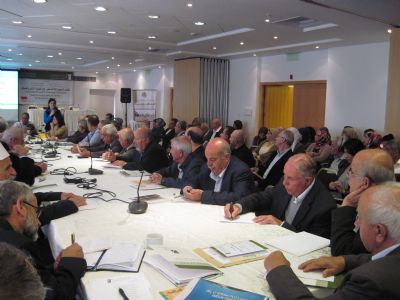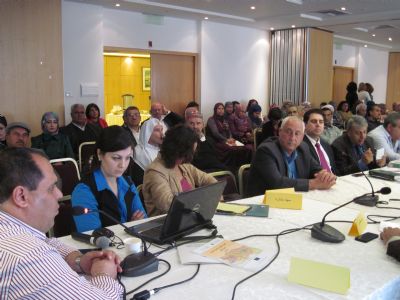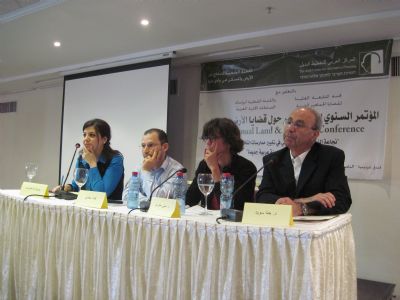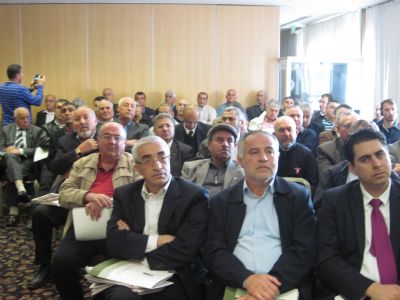Publishing date: 02/08/2013
ACAP implemented its annual Land and Housing Conference on April 23, 2013 at the Gardenia Hotel in Nazareth. The purpose of the conference was to present the most up-to-date planning issues and research affecting Arab communities, particularly the plan for a new Arab township. During the conference, SWAT analysis for the plan was presented by various positions, including political (which was presented by Members of Knesset), social, planning, and legal status. Over 158 individuals from various backgrounds attended the conference.
This year's conference was held in partnership with the Public Committee for the Defense of Land and Housing in Wadi Ara, and The National Forum of Arab Mayors. The conference theme was: "The efficacy of the professional and public struggle to change the practices of planning and the right to establish a new Arab city."
The conference was opened by Mr. Raja Khoury, director of the Arab Center for Alternative Planning, who noted that the last three years have been difficult and harsh for the Arab community due to the high number of discriminatory plans, forcing ACAP to double its efforts and work diligently throughout this period. He added that ACAP's staff derives its energies from its beneficiaries who do not get bored and give up.
Mr. Mohamed Zidan, Chairman of the Higher Follow-up Committee on Arab Affairs, welcomed the participants and strongly criticized the discriminatory planning policies of Israel. Mr. Omar Nassar, speaking on behalf of the National Forum of Arab Mayors, confirmed that 37 years after Land Day, there are still risks to Arab land, and the only difference is the methods adopted by the State institutions to the confiscation of lands; today, the confiscation is more indirect and done through imposed restrictions that prevent Arabs from using their lands for development projects.
Mr. Fahmi Halabi, head of the National Committee for the Defense of the Land and Housing in the Druze towns, praised the significant role played by the ACAP and Adalah, who supported by the Committee to defend Arab land in the Carmel and confront and stop several government plans that aimed to confiscate thousands of acres of land belonging to the people of Dalia Carmel and Isfiya.
Mr. Khalil Abu Madem, head of the Popular Committee for the Defense of Land in the Arakeeb, stressed that despite the ongoing demolition of the village of Arakeeb, the people still are attached to their land and continue to rebuild homes despite being demolished. He stressed the need for Arab civil institutions to intensively support the people of Arakeeb.
Enaya Banna-Geries, ACAP's head urban planner, presented various planning issues that ACAP has worked on in the past year and discussed the achievements in its professional work, including halting plans to build a gas pipe that would result in confiscation of hundreds of dunams of land belong to the Arab town of Toran.
Advocate Fouad Ma'dey, representative from the People's Public Committee from the village of Burka, shared his experience working with ACAP and the joint success in the making changes to the structural plan imposed on the village which ignored more than 200 houses East of the town. He stressed that this success is a precedent in this area and can be used as a model in future cases in other Arab towns.
Dr. Emily Silverman, lecture at the Hebrew University, lectured on housing in Arab towns, and mechanisms of action that must be approved by the citizens of any Arab town and the local authority, including the People's Committee, in order to secure and open the possibilities of housing affordable for young couples in them.
The final lecturer of the first session was Knesset Member Dr. Hanna Swaid. He stressed the important role of the Arab Center for Alternative Planning and praised the importance of the work of the People's Committees for the Defense of Land in the various Arab towns. Swaid called for the continuation of professional work and public and political persistence to work towards equal planning rights.
The second session of the conference included a round table panel discussion on the issue of the establishment of a new Arab town in the historic village of Tantur. Enaya Banna Geries provided a detailed explanation about the history of the evolution of the plan and the negative repercussions on the people of the town of Jdaide-Maker, and the people of the region in general. Each of the participants were given the opportunity to explain their point of view regarding the from their angle. Professor Rasim Khamaisi presented the plan as being positive and serves the general interest of the Arab masses, casual so each of the following head of the local council in the new guile where he said he was against the establishment of Arab town new the expense of land originally intended for the expansion of new cunning.
Attorney Suhad Bishara provided detailed intervention of human rights around the judicial side of this plan. Contributing to the implementation of the plan comes at the expense of the other neighboring Arab towns.
MK Dr. Basil Ghattas considers the plan very offensive to the citizens of Jdaide-Maker. Such a plan will result in turning these towns in poverty neighborhoods. Ghattas also discussed the importance of Arabs focusing on real estate. He added that the size of the real estate market of the Arab community in the country today is almost 60 NIS. that the opening of this market and exploitation can cause great economic leap for the Arab community.
Dr. Hanna Swaid strongly criticized the plan and suggested that the mayor of Jdaide-Maker submit a request to expand the jurisdiction of the two towns to ensure the future of their development.
Mr. Ahmed Melhem, Chairman of the People's in Wadi Ara, spoke about the importance of concerted efforts between the public and local council in order to put forward a unified position in front of the planning institutions. He stressed the seriousness of the plan and the urgent need to address it.
It was agreed at the end of the conference that ACAP, in cooperation with the People's Public Committee in Jdaide-Maker, would prepare a position paper to be submitted to the National Council for Building and Construction that details the social and economic implications of this planned planning for the population in the new deceit and the region in general.
